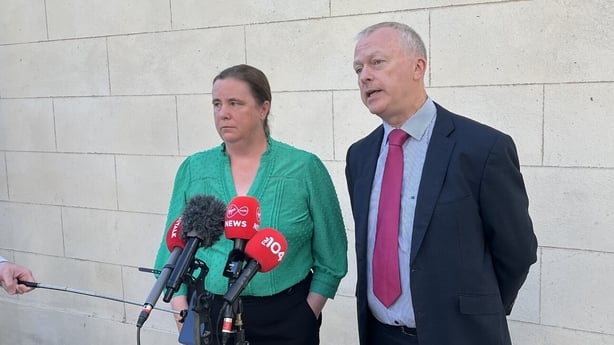International gangs are using Irish ports to smuggle drugs into other parts of Europe, the head of the Garda National Drugs and Organised Crime Bureau has said.
Detective Chief Superintendent Séamus Boland said cocaine is mostly coming into Ireland from South America.
"Drug trafficking networks are continuously trying to change their methodology. They're continuously trying to find new routes into Europe to supply their trade," he said.
Speaking on RTÉ's Morning Ireland, Mr Boland said that there have been significant drug seizures across Europe in recent years.
We need your consent to load this rte-player contentWe use rte-player to manage extra content that can set cookies on your device and collect data about your activity. Please review their details and accept them to load the content.Manage Preferences
Some drug seizures in Ireland have come directly from South America, while others had originated in Europe, he revealed.
Detective Chief Superintendent Boland was speaking after the seizure of drugs worth over €33m at ports in the past week.
Yesterday, cocaine worth an estimated €10.5 million was seized by gardaí and Revenue officers at Dublin Port.
In a separate drugs detection last Thursday at the Co Wexford port, Revenue officers seized 104kg of cocaine, with an estimated value of €7.2m.
Mr Boland said that these seizures can dismantle supply routes, as those routes are risky to use once they have been discovered.
We need your consent to load this rte-player contentWe use rte-player to manage extra content that can set cookies on your device and collect data about your activity. Please review their details and accept them to load the content.Manage Preferences
'Significant increase' in wholesale price of cocaine
The seizures have contributed to a rise in the wholesale price of cocaine, according to Mr Boland.
"One of the issues that we've seen in this jurisdiction, and particularly since the end of last year, is that there actually has been a significant increase in the wholesale price of cocaine being imported into this jurisdiction," Mr Boland added.
He said there has been an increase "in the region of even up to a third of the wholesale price of cocaine for kilos of cocaine being imported into Ireland since late last October".
Mr Boland said: "When kilos of cocaine would have maybe been available in the region of €25,000 plus, we've seen them reach prices in the region of €40,000, so it's even more than a third at times.
"When you're dealing with it with an industry like the illicit cocaine industry, you're talking about a supply versus demand industry, and the basic economics of that are that if supplies are short or supplies are difficult to get in at any given time, normally you'll see increase in prices."
He said the authorities here hope the seizures over the last week will "hopefully continue that trend and make it more difficult".
Mr Boland said the "significant increase in the volume seizures" come as "no surprise" to law enforcement officials in Ireland.
He added: "This is replicated all across Europe, and particularly in some of the main European ports, particularly Antwerp and Rotterdam. Over the last five or six years, the volume of cocaine being imported has been significantly increasing."

Cocaine seizures 'deep concealments'
The Acting Director General of the Revenue Customs Service described the cocaine seizures at Dublin Port and Rosslare Europort as "deep concealments".
Ruth Kennedy said that there was "a lot of work done" by traffickers to ensure that the narcotics had been "extremely well hidden".
Revenue officers deployed X-ray scanners to locate the drugs, along with detector dogs, which she said were "an absolute great resource".
"I think our work is shown by the developing and sharing of intelligence and the use of all the resources and capabilities we have, along with all the legislative provisions we have. We can make a significant impact and disrupt the trade."
She said that recent seizures "represent an important amount of product that now isn't on our streets", noting "the devastation" those drugs cause.
As criminal gangs change their tactics, Commissioner Kennedy said, so to do the authorities here.
"We can see that the crime gangs change their tactics and we have to be agile at how we deploy our resources and how we work together in sharing and collaborating to make sure we can respond to those tactics," she said.
Mr Boland however said deep concealment of the drugs is a trend that is occurring globally, but that it is not a new tactic.
He said: "We're seizing almost on a weekly basis at this stage, in all of our investigations, regular vehicles driving around Dublin, driving around Limerick, driving around any town in the country which have specialised deep concealments, some which are very difficult to access, some at hydraulic entry points as well.
"That's how organised crime gangs are adapting all the time and it's up to us to stand up to that challenge."
Additional reporting Fergal O'Brien

